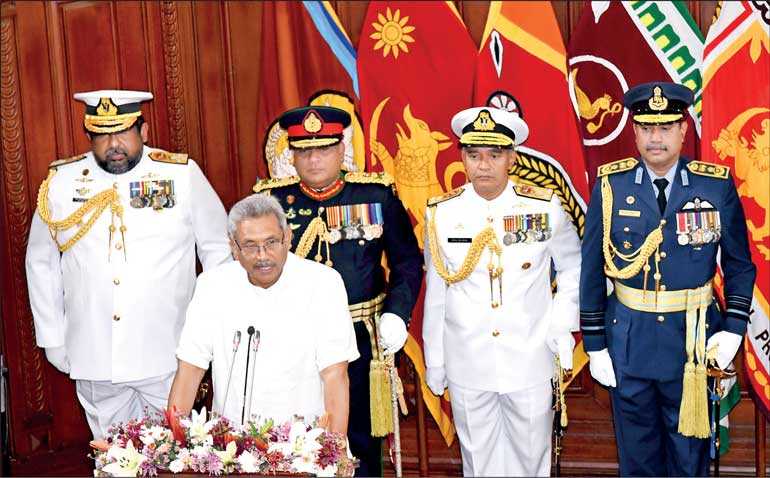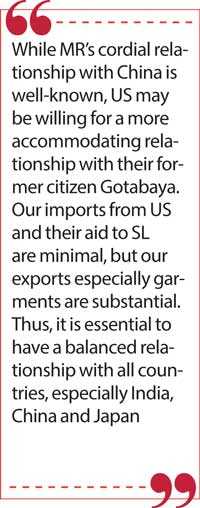Monday Feb 16, 2026
Monday Feb 16, 2026
Wednesday, 30 September 2020 00:00 - - {{hitsCtrl.values.hits}}

It would be the responsibility of President Gotabaya Rajapaksa with newly-awarded powers under the 20th Amendment to guide Sri Lanka towards a prosperous country with cordial relations from all countries – Pic by Shehan Gunasekara
President Gotabaya Rajapaksa was elected in November 2019, but the Constitution restricted him from dissolving the Parliament until completion of four and half years. He ruled with a new Cabinet without  touching any controversial issues. The parliamentary elections planned for 25 April had to be postponed twice due to COVID-19. Finally elections were held on 6 August and Sri Lanka People’s Freedom Alliance (SLPA) headed by his brother Mahinda won the election with 147 seats out of 225-member Parliament.
touching any controversial issues. The parliamentary elections planned for 25 April had to be postponed twice due to COVID-19. Finally elections were held on 6 August and Sri Lanka People’s Freedom Alliance (SLPA) headed by his brother Mahinda won the election with 147 seats out of 225-member Parliament.
Planning to repeal the 19th Amendment
The 19th Amendment made the President just a puppet controlled by the Prime Minister, possibly creating a split between the President and the Prime Minister. The amendment was responsible for making the Yahapalanaya Government ineffective. According to 19A the appointment of ministers by the President would be on the recommendation of PM. The President cannot even be the Minister of Defence, although he is responsible for the armed forces.
During the parliamentary elections SLPA requested voters for a 2/3rd majority to repeal 19th Amendment to the Constitution (although it was passed with almost every one voting in favour). The election results gave SLPA almost the requirement as balance could be easily bought over.
The new Government presented the draft Bill ‘Twentieth Amendment to the Constitution’ on 3 September, less than a month after the elections. When challenged by the opposition for the ownership of 20A, Gotabaya accepted responsibility.
The proposed 20A raised concerns among the public, also within the governing party and a Committee was appointed headed by G.L. Pieris to make recommendations for revisions. The draft with Committee recommendations were expected to be gazetted. But as re-gazetting would delay the bill by minimum two weeks, the President wished to continue and make amendments during the Committee stage.
Gotabaya planning in advance
The former Secretary for Defence annihilated LTTE which the world believed to be impossible. The success was possible due to detailed advance planning and execution with amendments when faced with unexpected challenges.
Gotabaya Rajapaksa during the campaign presented the ‘Vistas of Prosperity and Splendour’ most comprehensive policy statement by any contestant over the country’s history, showing his planning abilities. But the plans had to be suspended when the country faced the corona situation. For almost one year he was unable to implement his plans.
Under the current scenario the President used security forces under him to defeat the corona pandemic and is eradicating the drug menace and the control of drug mafia from the prisons. The President appointed young MPs as Junior Ministers and gave them the responsibility of encouraging villagers to produce items that were imported. But how about major urgent projects?
Impatient President
Under the 19A the President has no power on major projects, whose finances come under the Ministry of Finance, controlled by the Prime Minister. The largest project under implementation is the Colombo Port City, whose Colombo International Financial City regulations are awaiting approval from the  Parliament which is expected to ‘fill the vacuum between Singapore and Dubai’ would be a major income earner and an employment provider for the country.
Parliament which is expected to ‘fill the vacuum between Singapore and Dubai’ would be a major income earner and an employment provider for the country.
Mahinda Rajapaksa as Finance Minister informed that the Pettah-Malambe Elevated Railway Project funded by Japan was suspended due to financial limitations. In addition, when some trade unions in Colombo Port went on strike demanding East Container Terminal be developed and operated under the Port Authority, the PM was able to end the strike after discussions with the unions, but details of the agreement was not made public.
Most likely, the President wishes to avoid misunderstandings with the PM his elder brother, especially when he is powerless under the current law. The President having wasted almost a year is impatient and wishes early acceptance of 20A, enabling him to address the problems of the country.
US actions on China
The US Commerce Department announced penalties against some Chinese officials and 24 companies for their role in building artificial islands in South China Seas, claiming dredging and developments cause environmental damage and infringe on other nations’ claims. Among the named companies is China Communications Construction Company (CCCC).
CCCC is the parent company of China Harbour Construction Company, the main promoter of Port City. Although CHEC claims the US sanctions have no effect on Port City, the exact fallout of the penalties are unknown.
The US Secretary of Defence had a telephone conversation with the President few days ago, but details of the discussion was not made public.
A balance between international relations
While MR’s cordial relationship with China is well-known, US may be willing for a more accommodating relationship with their former citizen Gotabaya. Our imports from US and their aid to SL are minimal, but our exports especially garments are substantial. Thus, it is essential to have a balanced relationship with all countries, especially India, China and Japan.
During the recent past most major development projects were Chinese, funded with loans at commercial interest rates. Japan offered a number of projects, extremely high quality, but at a higher cost, at very low interest with long-term repayment making them most attractive.
Meanwhile, our relations with the neighbour India has been not satisfactory, possibly due to their role in supporting LTTE. But lately the relations have been improving.
Commercial relations with India
Over the years there were a number of project proposals with India. In 2002, PM Ranil Wickremesinghe handed over to India, the unused massive oil storage tanks in China Bay, Trincomalee built by British during the Second World War. The facility with 99 usable tanks each having a capacity of 12,100 tons, totalling over one million tons. But so far IOC has utilised only 14 tanks. The country having handed over all tanks, have made various proposals to utilise the tanks, but nothing materialised.
During a visit in 2015, Indian PM Narendra Modi, highlighted that developing the tank farm “would help the coastal town become a regional petroleum hub”.
A proposal to build an oil refinery in Trincomalee jointly with India using tanks as storage failed to materialise.
Public finances
So far, the Government expenses showed two clear differences, while most imports are controlled or completely stopped due to shortage of foreign exchange, local expenses do not show any cut backs. Employment to 50,000 graduates, also 100,000 unemployed with poor education, were promised state employment. But Government staff salaries are paid with loans obtained by the Central Bank from
Government banks. How long can this continue?
Government finances are controlled by the Finance Minister MR, claimed some proposed development projects need be curtailed due to financial constraints. But other expensive projects are proposed.
The biggest venture the country keeps hopes on is the Port City Project. For proper functioning the project would require easy access to staff, to be provided with:
1. The road from the new bridge over Kelani River to Port City over the edge of the Colombo Port currently under construction
2. Extension of Marine Drive under the Galle-Face green and
3. Pettah to Malambe Elevated Light Rail Project.
Will 20A affect finance policy?
With the acceptance of 20A, the President would become the ultimate decision maker for the country and s number of policy changes are possible. MR’s affiliation towards China is well-known and may have benefited from same. But with Gotabaya taking over overall in charge, early action on urgent issues would be possible.
The country is facing difficulties in settling foreign loans and requested loan rescheduling from India and Japan. But failure to proceed with Indian and Japanese projects have resulted in a lukewarm response.
Although the country’s foreign reserves are poor, some proposed projects could be executed with minimal local funding. These projects would solve existing problems, create employment and enhance technical competence of workers.
During the last government, most projects proposed earlier were suspended and no new projects commenced, meanwhile the country’s requirements are expanding, needing new investments irrespective of availability of finances. We may have to take the path of Singapore, with hardly any own funds, the country has reached a level of development surpassing everyone.
Light Rail Transit System
A loan agreement was signed in March 2019 between Japan International Cooperation Agency (JICA) and Sri Lanka for JPY 30.08 b ($ 270 m) for the establishment of Light Rail Transit System from Colombo to Malambe. The JICA loan provided under Special Terms for Economic Partnership, carry interest rates of 0.1% per annum for civil works and equipment cost, 0.01% p.a. for engineering services cost with a 40-year repayment period including a 12-year grace period. But the Treasury has informed JICA of the government’s inability to continue with the project due to financial constraints. It is not clear how the JICA project would affect the Government’s finances as the loan payment includes a 12-year grace period.
Following the Government decision, Japan informed of their inability to continue with the promised 220 KW underground power cable project connecting Kerawalapitiya to Colombo Port.
There were unconfirmed reports that the LRT project would be awarded to China Harbour Engineering Company (CHEC). The only possibility of such a move would be to get a fat commission from the prospective contractor. It is well-known that the Japanese contractors’ prices are high compared to others, they do not offer commissions to politicians or officials, but deliver a high quality product on schedule.
East Container Terminal
The Port of Colombo recorded handling 7.2 million TEUS in 2019, and around 70% of Colombo Port’s transshipment business is India related. India is not too happy with their containers being handled by a Chinese dominated port and are developing their own ports, which would sure to affect Colombo.
After South Container Terminal the next in line for development was East Container Terminal (ECT) with a 1200m long quay wall, 18m deep berthing three mega ships, with a 57Ha container yard. In 2012 SLPA commenced construction of ECT and by 2015 when the government changed, SLPA had almost completed the 400 m long first phase with an investment of $ 80 million, allowing one berth and a container yard. SLPA had ordered container handling equipment to make terminal operational.
But the new Minister of Ports cancelled the cargo handling equipment order, claiming the tender was corrupt. Although the Ports Authority called an expression of interest with ADB for funding of ECT development, nothing happened over the five-year period.
In July 2019 an agreement was signed between India, Japan and SLPA to develop and run the ECT. According to agreement Sri Lanka will maintain a 51% stake in the company, while Japan and India will hold 34% and 15%, respectively. Development will be financed by Japan through a 40-year soft loan of between $ 500-800 million, at 0.1% interest rate with a grace period of 10 years.
Just prior to parliamentary elections port workers struck work demanding the ECT be run locally. After unions had talks with MR the strike stopped. The terms of agreement was not made public.
While the port development dragged on, number of ship arrivals and containers increased, the port efficiency dwindled, increasing waiting time for ships. The current port capacity allows simultaneous accommodating only two large ships of 360m length and additional capacity is urgently needed. Handling world’s largest ships of 24,000 container capacity would require a port depth of 16 m, planned in ECT, also in West Container Terminal.
Meanwhile, Global shipping giant Maersk, already a partner in SAGT, has expressed interest in developing the ECT. Maersk has single-handedly supported Malaysia to develop port Tanjung Pelepas (PTP) near Singapore, now handling around eight million containers a year.
The President will need to make an early final decision on the ECT deal. It would be best to award the ECT to India/Japan/SLPA joint venture and offer the Western Container Terminal awaiting development to Maersk, a win-win situation.
Additional petroleum refinery
The current 50-year-old Sapugaskanda oil refinery supplies only 35% petroleum needs of the country and the balance is imported. In addition our storage facilities for petrol, diesel and kerosene is only around two weeks requirement, making the country needing frequent replenishment from overseas.
There were number of proposals to increase Kolonnawa refinery capacity, establishing oil refineries including two refineries in Trincomalee and in Hambantota. Before 2017, a 100,000 barrels a day refinery was agreed to be built at Trincomalee by Indian Oil Company. But when challenged in court over environmental issues President Sirisena withdrew the proposal. Another refinery proposed in Hambantota by Singapore’s Silver Park International Ltd. and Oman’s Ministry of Oil and Gas. But again no further progress.
The Trincomalee oil tank farm has been leased to India for 50 years, extendable up to a maximum of 99 years, but only 15 of the tanks are used by IOC. Thus the establishment of a new petroleum refinery with Trincomalee oil farm for storage of crude and refined oil and a strategic oil storage.
Discussion
The world has changed, Russia is no longer considered a world power. Hard working Chinese population who save a high percentage of income, has made possible for China to invest heavily world over. The Commonwealth, Non-aligned nations, SAARC all have become inactive and cannot support a member country in an emergency. When US commands unilateral restrictions on selected nations, other countries keep quiet. With China and India fighting over boundaries in Kashmere, India has moved towards US. In a world deprived of joint support from each other countries, small countries like ours cannot afford to neglect powerful neighbours.
Last government failed to implement even a single major project and some requirement issues have become crucial, as discussed above. With financial constraints, implementation of urgent projects would require the country moving towards a new direction, a path used by Singapore. Allowing external parties and the private sector to implement large projects for local usage and exports, making use of Sri Lanka’s strategic location and available resources.
Under current regulations, presidential elections were conducted at a huge expense, but the result is a powerless President, the 20A would correct the anomaly. President Gotabaya prior to elections had presented a detailed program ‘Vistas of Prosperity and Splendour’ for the development of the country, but the lack of authority restricted him from implementing the program.
As shown above, the East Container Terminal and JICA funded Light Rail Transit System need immediate implementation as financial provisions have already been arranged, also showing the world that Sri Lanka is non-aligned. Other projects as efficient utilisation of Trincomalee oil tanks for an oil refinery and balance tanks for strategic oil storage as suggested by Indian PM are among possibilities. In addition Chinese projects too could continue as required.
In the past most investments came from China, resulting the country being labelled as pro-China with the possibility of facing economic restrictions. Sri Lanka always had a policy of non-alignment. Among the countries that help us are neighbour India, Japan and China and need a balancing act, especially when quality funding is available with minimal local investment.
Thus it would be the responsibility of President Gotabaya Rajapaksa with newly-awarded powers under the 20th Amendment to guide Sri Lanka towards a prosperous country with cordial relations from all countries.